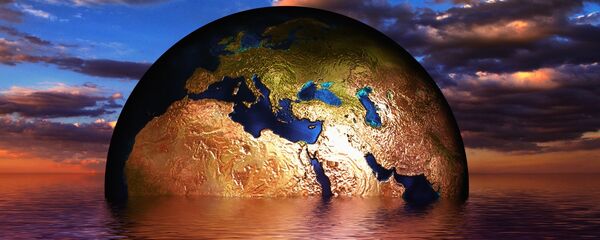WMO Statement on the State of the Global Climate in 2016 https://t.co/FzNDfcO9tR #WorldMetDay #StormHour pic.twitter.com/vq69OwI0Tx
— #StormHour (@StormHour) March 21, 2017
The report found a number of environmental factors are moving rapidly beyond human understanding — globally, sea levels have risen by 20 centimeters since 1900, primarily due to thermal expansion of the oceans, and melting of glaciers and ice caps.
"Even without a strong El Nino in 2017, we are seeing other remarkable changes across the planet that are challenging the limits of our understanding of the climate system," said World Climate Research Programme Director David Carlson.
February 2017 was an exceptionally warm month — the second warmest on record, according to the National Oceanic and Atmospheric Administration (NOAA), after February 2016. NOAA also reports that 11,743 warm temperature records were tied or broken in the US alone.
Average sea surface temperatures in 2016 were the warmest ever recorded, but as sea levels rise, Arctic ice levels are falling and struggling to sustain throughout winter, with the seasonal maximum of Arctic ice — 14.52 million square kilometers on March 23 — the lowest in the 1979-2016 satellite record. Elsewhere, the 2016 autumn freeze-up was exceptionally slow, with sea ice extent even contracting for a few days in mid-November.
Provisional figures show 2016 was the driest on record over the Amazon Basin, with significant droughts in north-east Brazil. For the second year in a row, rainfall in Southern Africa was widely 20 to 60 per cent below average for the summer rainy season in 2015/2016.
The WMO report cites numerous examples the authors believe demonstrate mankind's inability to truly deal with the deleterious impact of volatile environmental conditions. For instance, the World Food Programme estimates that 18.2 million people would require emergency assistance by early 2017. By 2040, 600 million children will face water shortages — roughly 1 in 4 children worldwide.
In 2016, Hurricane Matthew, the first category four storm to make landfall since 1963, caused widespread devastation to Haiti. Millions suffered food and power shortages, with global aid organizations unable to coordinate a truly effective response.
The largest wildfire in Canadian history broke out in Fort McMurray in May 2016 — it devastated 590,000 hectares of land, engulfing 2,400 buildings and leading to the total evacuation of the city. Strong winds and low humidity combined with temperatures in excess of 33C, sending the fire spreading out of control. It burned well into July.
Fort McMurray #wildfire named Canadian news story of 2016 https://t.co/G1DTD3Kviu pic.twitter.com/ZfoIvPMXKx
— FTS (@FTSEnviro) January 12, 2017
However, climate change is not merely a geological problem — it has wide-reaching consequences for the global economy, health and social cohesion posed by rising temperatures. Economic investment in climate change responses has been sluggish, but climate change has now become a significant economic problem.
The WMO note carbon dioxide levels in the Earth's atmosphere reached 400 parts per million in 2015, a symbolic benchmark, and are expected not fall for many generations to come, if ever at all, due to the long-lasting nature of CO2. These figures are already almost outside human comprehension, and should they rise further, the problem will be fully out of human control.
"We are seeing remarkable changes across the planet, challenging the limits of our understanding of the climate system. We are now in truly uncharted territory," said World Climate Research Programme Director David Carlson.
“Human influence on the climate system is clear” #IPCC Chair at #UN event on #climatechange & #sdgs. Slides: https://t.co/ekMMQhRSqB #ar5 pic.twitter.com/rhcKG7SzkW
— IPCC (@IPCC_CH) March 23, 2017
Previously, the major question hovering over climate change was that of its existence. Now, climate change has been deemed irrefutable by a host of scientific organizations — and the connection between human activity and climate change judged unassailable.
"With levels of carbon dioxide in the atmosphere consistently breaking new records, the influence of human activities on the climate system has become more and more evident," commented WMO Secretary-General Petteri Taalas.
Now, the WMO ask whether mankind is in fact too late to improve environmental conditions to a suitable degree to ensure their future survival — and the longevity of the planet.
Decarbonization roadmap: halving anthropogenic carbon-dioxide (CO2) emissions every decade #ParisAgreement https://t.co/heBuJU7RRl pic.twitter.com/QzLJjgMknV
— Val. Masson-Delmotte (@valmasdel) March 24, 2017
The Paris Agreement was entered under the UN Framework Convention on Climate Change November 2016, a landmark in governmental tackling of climate change. However, implementation remains theoretical — practical, efficient change is still required, with Taalas stating the agreement needs to curb greenhouse gases, foster climate resilience and facilitate mainstream climate adaption into national development policies.
The WMO report was presented to UN member states and climate experts at an event on Climate Change and Sustainable Development in New York March 23.





